10 Unhealthiest Plant-Based Meats
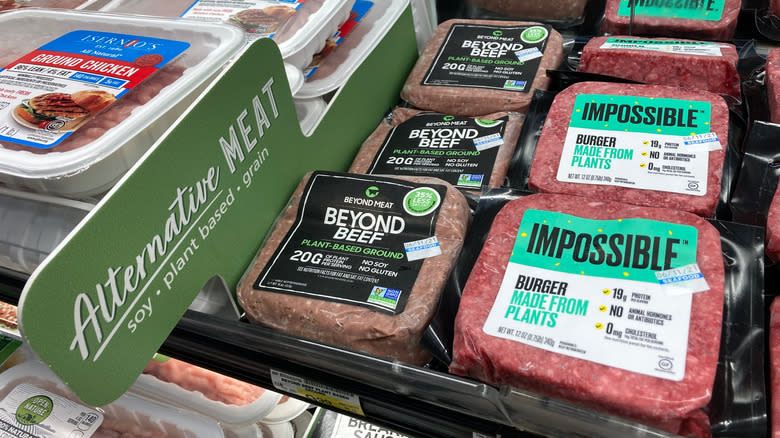
Luring carnivores into a more planet- and health-friendly way of eating was the spark that lit the flame of the plant-based meat movement. Before alternative food producers realized there was money to be made in non-animal substitutes for beef, pork, and chicken, vegans had scant options for joining in on the backyard barbecue. There were Morningstar Farms black bean patties, Boca burgers, and Quorn nuggets, all fully plant-based but not nearly sexy enough to live up to the standard of actual burgers, let alone ground beef, chicken nuggets, or lunch slices. Thanks to companies like Impossible and Beyond Meat, the plant-based meat sector has gone supernova.
But plant-based substitutes don't always measure up when it comes to nutrition, even when they remove saturated fat and factory farming from the food manufacturing equation. There's a definite profile for unhealthy plant-based meats that chase the twin gold medals for flavor and enjoyability, resulting in compromised nutritional value. The most obvious offenders include saturated fat, highly processed ingredients, and enough sodium to give consumers cause for pause. But there are also calorie counts and ingredient quality to consider. Among the ever-expanding list of animal meat analogs hitting the market, these 10 products represent the unhealthiest plant-based meats you're likely to encounter on your shopping adventures.
Read more: 6 Canned Meats You Should Buy And 6 You Shouldn't
1. Impossible Burger
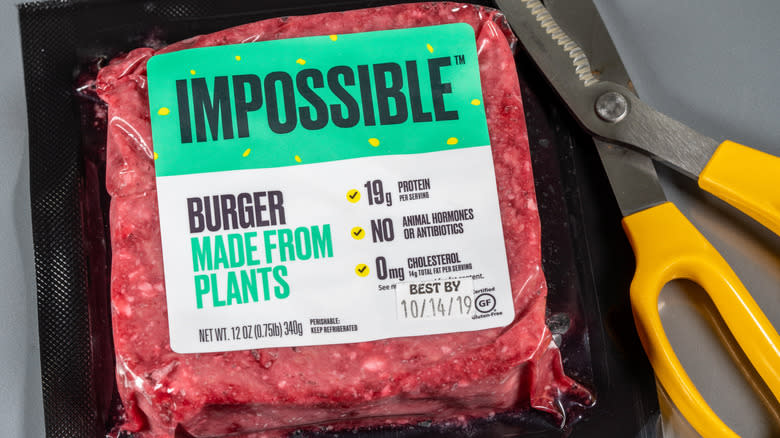
To show the world the potential for cruelty-free meat even omnivores can love, Impossible concocted a thoroughly convincing vegan-friendly re-creation of a traditional burger and slid it into refrigerated cases around the U.S. It even bleeds as you cook it, thanks to a genetically-modified plant additive, soy leghemoglobin. Though it's clearly labeled as a plant-based product, the texture and taste are so similar to the real deal that even fast-food giant Burger King launched a Whopper alternative using Impossible patties to introduce the greater dining world to the potential of plant-based burgers consumers would embrace.
Part of the allure was the greasy nature of Impossible, a feature that arises from the coconut oil content. This contentious fat source is known to elevate both HDL and LDL cholesterol in a way that other plant-based oils don't. Without plentiful research on the perceived benefits of coconut oil, choosing to use it in plant-based meat that gets fried and grilled can potentially reduce the nutritional benefits of an animal-free diet. Replicating beef using plant-based ingredients isn't impossible for Impossible, but making it healthy sure is.
2. Beyond Meat Stack Burger
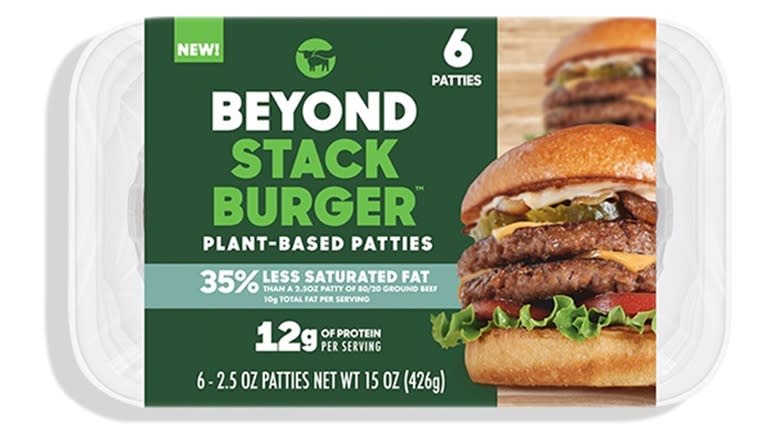
If what lies Beyond Meat are these questionable meat-free patties, you might want to stay on this side of the fence and grill up a homemade black bean burger instead. Beyond has done an admirable job of capturing the aspects of burgers meat-eaters love: the juiciness, texture, and even the color, thanks to beet extract. The use of pea protein also lets the company steer clear of soy-based protein, which can cause digestion issues for sensitive eaters.
So if Beyond went to the trouble of adjusting its protein source for a more easily digestible option, why would it resort to using coconut and canola oils to flesh out its recipe? The obvious answers are flavor and sizzle, of course. But these aspects come at the expense of healthfulness. Not to mention, these thinner Stack Burger patties are meant to be eaten as a double- or triple-burger, which multiplies the 3 grams of saturated fat — 15% of your daily allowance — in each layer. The result could mean consuming most of your apportioned saturated fat in a single meal. So much for plant-based meat being a healthy option.
3. Gardein Spicy Italian Breakfast Saus'ge
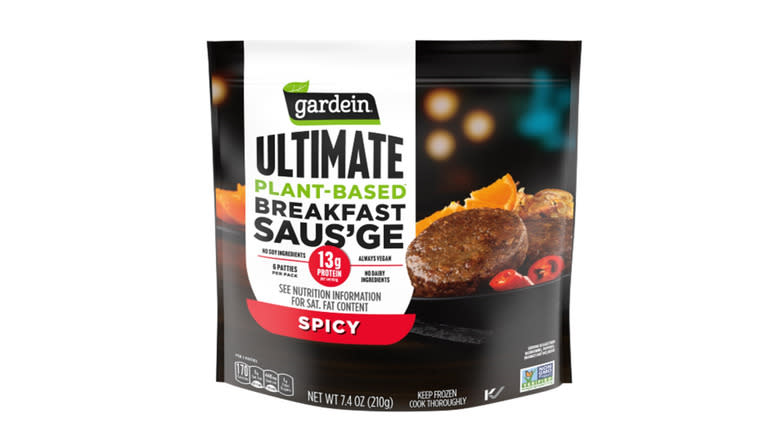
Omitting letters from traditional meat names is the workaround Gardein uses, labeling its Spicy Italian Saus'ge with a moniker that distinguishes it from actual sausage. The prospect of spicing up traditional pasta dishes or sub sandwiches with plant-based sausage sounds like a hearty eater's dream come true. Anyone switching to a more mindful eating plan would be over the moon to find out there's no sacrificing sausage when you can shop for Saus'ge and have pretty much the same dining enjoyment.
More cautious carnivores making the shift might want to pump the breaks, however. While the plant-rich ingredients Gardein incorporates into its magical links may be an improvement over real meat, the 3.5 grams of saturated fat and 660 milligrams of sodium per link put a kink in the idea of healthy eating. With canola oil as the fat of choice in this recipe, Gardein makes a less-than-ideal choice that places its so-called sausage on the "skip it" list if healthy eating is in the plans.
4. Simple Truth Black Forest Ham Slices
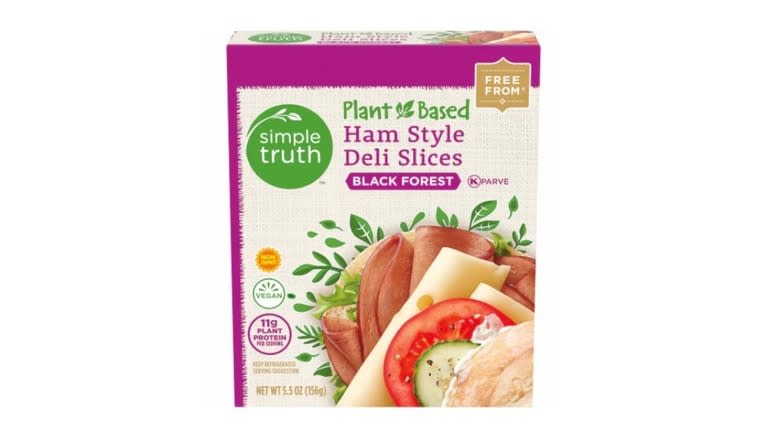
Having a cruelty-free lunch meat replica is a permanent plant food solution that puts charcuterie boards and club sandwiches back on the menu for anyone hoping to trim the fat on their meat-based dining. Simple Truth Black Forest Ham slices from Kroger's organic in-store brand are a perfect example of how elegant plant-based meat can be. There's no marbled oddness aiming to fool people into thinking this is real meat; it's enough to have thinly sliced plant matter with its own personality hanging around the packaged deli section. What self-respecting grazer wouldn't jump in and try it?
It's important to remember that looks can be deceiving. Though the texture and flavor are convincing enough to make herbivores happy, the ingredients are a different story, at least one in particular. Carrageenan is a thickener made from red seaweed and used in many processed foods, even animal-based items like cheese and ice cream. But carrageenan also causes digestive issues for some eaters, and may even play a role in inflammatory bowel disease. If the compromise you make with these slices has the potential to impact your health negatively, then this is one plant-based meat you'll want to strike from your shopping list.
5. Omni Plant-Based Luncheon Slices
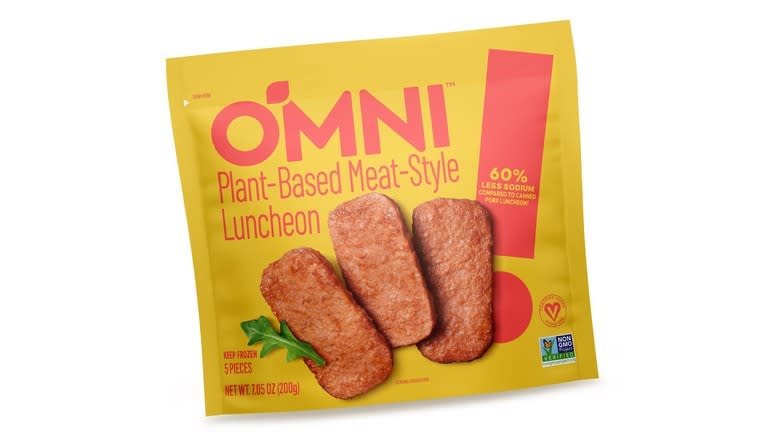
In the processed food world, "luncheon slices" appears to be another way of saying "SPAM" without violating the trademark. So when you see Omni Plant-Based Luncheon Slices on store shelves, you have a better idea of what you'll be getting. This is a vegan version of the popular canned meat that avoids the troublesome nitrates while sidestepping the need for a meat-based loaf that's shelf-stable. You can practically hear the crowd clamoring from the SPAM shelf to the vegan aisle to find the next best thing to the original.
But now we know that even plant-based luncheon loaves have their drawbacks, in the form of a super-high saturated fat content. One slice of this hearty analog delivers 20% of your daily allowance of saturated fat directly into your digestive tract. Yes, that's less than the 30% you'll find in a slice of Classic SPAM, but it's not low enough to keep Omni Luncheon Slices in the realm of healthy eating, especially with so many other plant-based meats on the market that do a better job in the saturated fat department.
6. Gardein Spicy Chick'n Filets
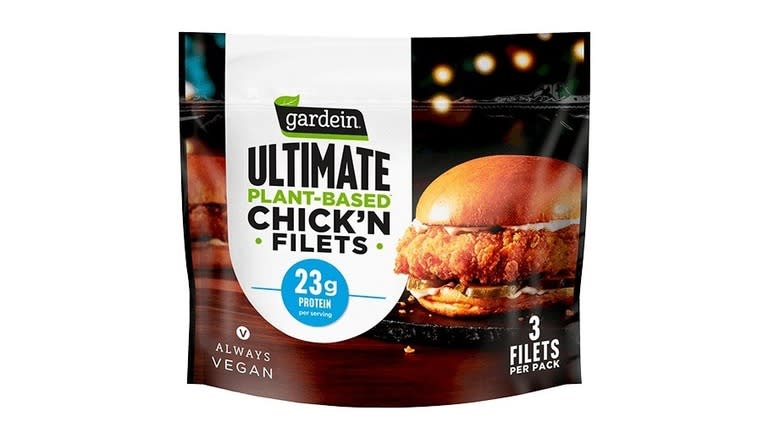
If chicken sandwiches are the alternative to burgers, then Gardein Spicy Chick'n Filets are the alternative to chicken sandwiches. These breaded patties may be as close as vegans can get to enjoying a Chick-fil-A experience once they've sworn off real chicken. They're nicely spiced and packed with 24 grams of plant-powered protein, so they're no garden-variety plant patty. Plus, they sure look attractive sitting between bun halves in the photo on the package. What a delicious turn of events in the world of non-animal food.
Perusing the nutrition facts draws a slightly less enthusiastic response though. Each filet (or is it a fil't?) carries 300 calories and delivers a stunning 900 milligrams of sodium. There are also 13 grams of fat in the mix, an add-in that undoubtedly ramps up the flavor while causing the nutritional benefits to bottom out. Gardein goes to great lengths to process the Chick'n material, working in vital wheat gluten to create the texture of real chicken, while complicating matters for gluten-free eaters. Nutritionally speaking, it's easy to see this pretend chicken is for the birds.
7. Impossible Savory Sausage
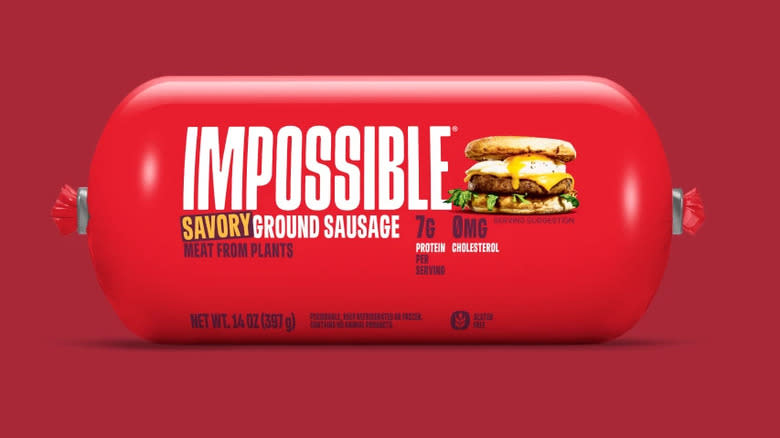
Breakfast meats should have a champion fighting for their place on the plant-based table, which explains the appearance of Impossible Savory Sausage in the company's growing collection. This bulbous package even comes as a traditional chub-shaped tube, allowing home cooks to recreate their favorite sausage-based recipes in cholesterol-free form rather than doling out a sausage replacement in pre-formed circular slices. That flexibility could set the plant-based meat world on its leafy green ear!
The truth about Impossible Foods is that it's so dedicated to recreating a meat-based experience for sausage lovers that it skews the balance of nutrients-to-flavor to the enjoyment side of the scale more often than the healthiness side. Every 2-ounce serving plates up 20% of your advised daily intake of saturated fat, thanks to a double-up of sunflower and coconut oils. As with real sausage, there's also a heavy dose of sodium here — 380 milligrams to be exact, or 17% of what you should eat in a day. When crumbled and mixed into eggs or spaghetti sauce, it becomes, yes, impossible to know how much you're eating, which only makes matters unhealthier.
8. Abbot's Butcher Whole Burger
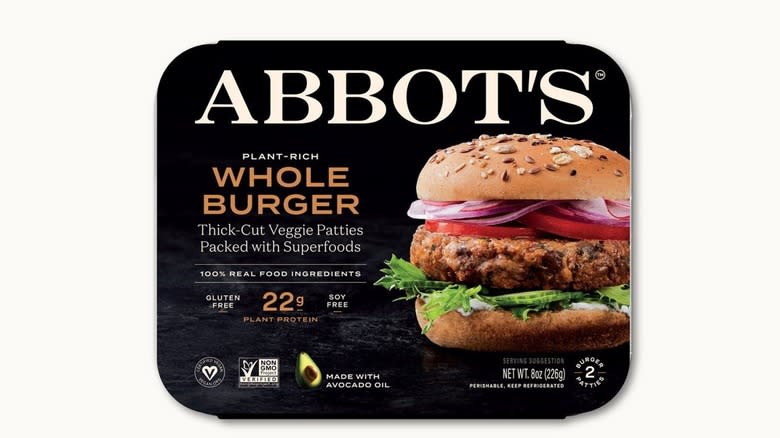
Abbot's is a specialty brand in the world of plant-based meats, so items like Abbot's Plant-Rich Whole Burger represent a heightened version of the generic food form. This may explain the relatively high 200 calories contained in each patty. It's lower than the average 325 calories in a beef patty, but if you're eating plant-based, shouldn't you expect under 200 calories for a single patty? Morningstar Farms can pull off a Garden Patty for a cool 100 calories, so it is possible ... just not with this burger replacement.
Despite broad announcements on the website regarding the inclusion of superfoods like chia and flax seeds, this food producer manages to include 460 milligrams of sodium in each burger. Sure, flavor is important but so is nutrition, and this much sodium — 20% of your daily intake — isn't worth the temporary enjoyment. Props to Abbot's for using whole-food ingredients with names anyone can recognize. If only it could bring the calories and sodium content down.
9. unMEAT Luncheon Meat-Style
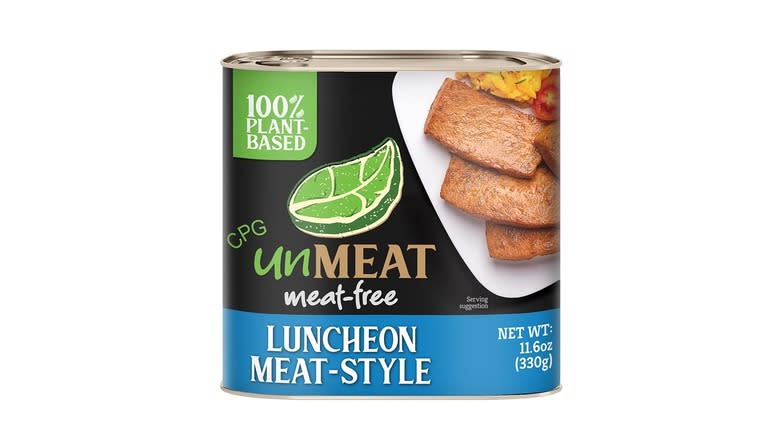
unMEAT Luncheon Slices aim to give SPAM die-hards with a taste for vegetable-centered dining another option to use for the popular Hawaiian dish loco moco, a combination of canned meat, eggs, and rice. With the surprising growth of SPAM popularity, it's a no-brainer for a plant-based food producer to stock shelves with its take on an American classic, an opportunity unMEAT has seized on. The company has also tackled innovative canned versions of plant-based chicken and tuna, a sector that hasn't seen its share of non-meat mock-ups yet. If cans are the format, then luncheon slices are a perfect fit.
They may not be a perfect fit for a healthy diet, though. The materials used to prepare the loaf-style meat stand-in include soy protein and wheat gluten, knocking the needs of ingredient-sensitive eaters out of the equation entirely. And the inclusion of palm olein, a fancy word for "oil," cranks up the saturated fat to 4.5 grams per serving, enough to cover 23% of your daily intake. To its credit, unMEAT doesn't use preservatives or GMO ingredients in its luncheon slices. But more nutritious options are available, even if it means making your moco a little less loco for the sake of your health.
10. Everything Legendary Burgers
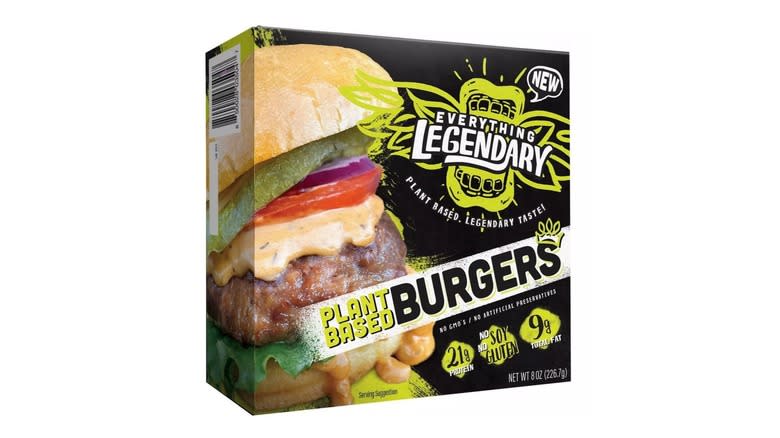
There's a visual edginess to the packaging design used by Everything Legendary, a Shark Tank champion that burst onto the meat replacement scene after garnering a deal with Mark Cuban. The exposure put the company on the map and pushed its alternative patties into major grocery stores all around the U.S. The success story is part of the attraction for mindful shoppers; who wouldn't want to support a small business that started as a grassroots enterprise and broke big thanks to its dedication to cleaner eating?
If only the product lived up to the backstory. Sadly, Everything Legendary Burgers isn't one of the healthier options on the block. A glance at the nutritional info on the label is a study in plant-based disappointment. Consume a single burger, and you'll rack up a full 20% of your recommended intake of both saturated fat and sodium — a one-two punch to your internal systems that plant-based eating is designed to circumvent. The ingredients are largely whole-food based; coconut and canola oils seem to be the source of the fat content, while salt appears multiple times on the list to jack up the sodium levels. Instead of steering you clear of non-nutritional nonsense, Everything Legendary drives full-bore into the fray. It may taste like heaven on a bun, but it's bound to deliver complicated chemicals in concentrations you're better off avoiding.
How We Chose Our Plant-Based Meats
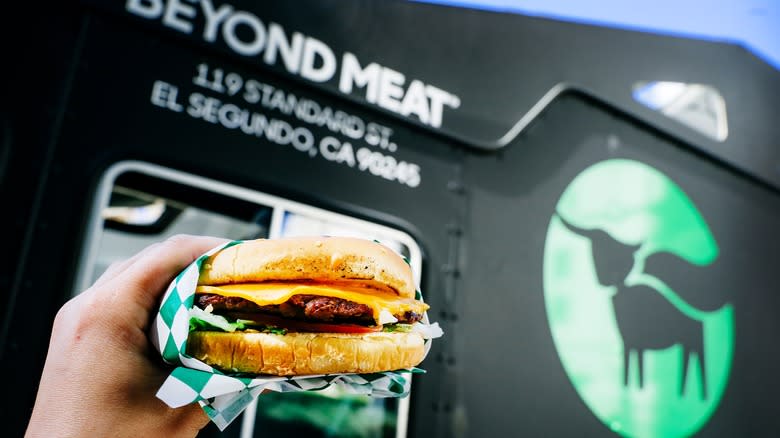
We chose the unhealthy plant-based meats for this feature by examining label information concerning the most crucial hallmarks of nutrition: calories, fat, saturated fat, and sodium content. We also examined the quality of ingredients used in each product's formulation, searching for highly processed elements like vital wheat gluten. Although substances used in plant-based meats may remove the need for animal ingredients, they don't always equate to a healthier eating experience for the consumer.
If you're a cautious eater seeking meat alternatives to save animal lives or preserve the environment, every plant-based option helps you keep your ethics in check while chowing down. If you're in it for your health, there are highly ill-advised options floating around that may taste delicious, but the nutrition profile isn't necessarily great. The idea that it's healthier than real meat doesn't always jibe with what a healthy alternative should provide, which is whole-food ingredients formed with as little processing as possible, and without additives that improve taste and texture while compromising nutrition.
Read the original article on Mashed


